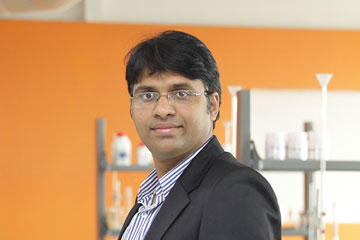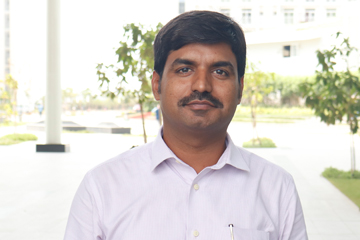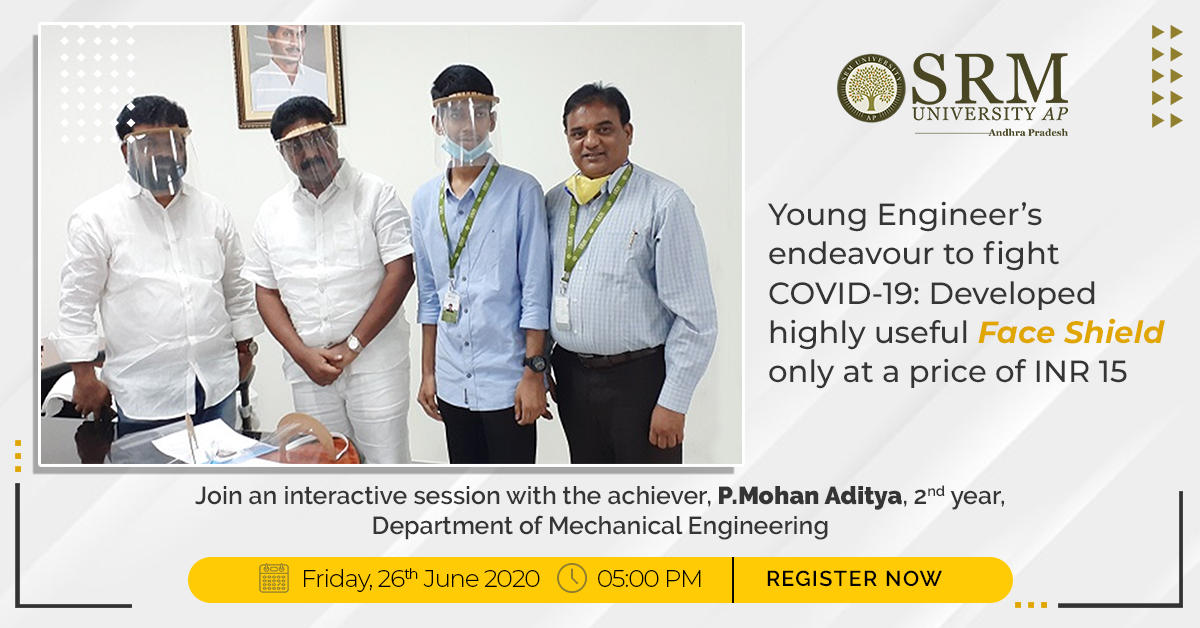- Synthesis of highly emissive and color tuanble CsPbBr3 Perovskite Nanocrystals via simple anion exchange June 27, 2020
 Dr. Nimai Mishra, Assistant Professor, Department of Chemistry, along with his research group comprising of his Ph.D. students Ms. V.G.Vasavi Dutt and Mr. Syed Akhil have published their recent work on “Fast, Tunable and Reversible Anion-Exchange in CsPbBr3 Perovskite Nanocrystals with Hydrohalic Acids” in the Journal “CrystEngComm”, Royal Society of Chemistry with an Impact factor 3.38.
Dr. Nimai Mishra, Assistant Professor, Department of Chemistry, along with his research group comprising of his Ph.D. students Ms. V.G.Vasavi Dutt and Mr. Syed Akhil have published their recent work on “Fast, Tunable and Reversible Anion-Exchange in CsPbBr3 Perovskite Nanocrystals with Hydrohalic Acids” in the Journal “CrystEngComm”, Royal Society of Chemistry with an Impact factor 3.38.  Cesium-lead-halide perovskite nanocrystals In the research work, Dr. Mishra’s group has developed a very simple facile synthesis process of perovskite nanocrystals with very high emissive properties and colour tunability. Colloidal caesium-lead-halide perovskite nanocrystals (NCs) (CsPbX3, X = Cl, Br, I) are presently on-demand because of their excellent photoluminescence quantum yield (PLQY), wide range of band gap tunability and defect tolerance, finding its application as photodetectors, light-emitting diodes (LEDs), asing, and photovoltaics. Dr. Mishra informs, “Anion ( the halides) exchange in colloidal caesium-lead- halide perovskite nanocrystals (NCs) is a highly efficient protocol to tune their chemical composition and optoelectronic properties. In this work, we first report the use of hydrohalic acids (HX; X=Cl and Br) as a precursor for anion exchange which can be an efficient way to control the composition and optical properties of CsPbBr3 perovskite nanocrystals (NCs).” Furthermore, the team demonstrated a facile and efficient approach of anion-exchange which is implemented to tune the optical properties of CsPbX3 perovskite NCs via a simple post-synthetic modification with hydrohalic acids. Importantly, this work presents a simple, feasible, reproducible synthetic route toward control halide exchange in metal halide perovskite NCs with various optoelectronic properties.
Cesium-lead-halide perovskite nanocrystals In the research work, Dr. Mishra’s group has developed a very simple facile synthesis process of perovskite nanocrystals with very high emissive properties and colour tunability. Colloidal caesium-lead-halide perovskite nanocrystals (NCs) (CsPbX3, X = Cl, Br, I) are presently on-demand because of their excellent photoluminescence quantum yield (PLQY), wide range of band gap tunability and defect tolerance, finding its application as photodetectors, light-emitting diodes (LEDs), asing, and photovoltaics. Dr. Mishra informs, “Anion ( the halides) exchange in colloidal caesium-lead- halide perovskite nanocrystals (NCs) is a highly efficient protocol to tune their chemical composition and optoelectronic properties. In this work, we first report the use of hydrohalic acids (HX; X=Cl and Br) as a precursor for anion exchange which can be an efficient way to control the composition and optical properties of CsPbBr3 perovskite nanocrystals (NCs).” Furthermore, the team demonstrated a facile and efficient approach of anion-exchange which is implemented to tune the optical properties of CsPbX3 perovskite NCs via a simple post-synthetic modification with hydrohalic acids. Importantly, this work presents a simple, feasible, reproducible synthetic route toward control halide exchange in metal halide perovskite NCs with various optoelectronic properties.Regarding the future scope of the research, Dr. Mishra informs, “These high-quality nanocrystals have the potential to be used as active material in LED devices, therefore our future plan is to make a prototype LED devices using our nanocrystals.”
Dr. Nimai Mishra is keen to collaborate, interested researchers may kindly contact him at nimai.m@srmap.edu.in
Continue reading → - SRM AP Students: Geared For The Post-COVID-19 Recovery June 27, 2020
Economies and businesses have been in a constant state of flux and disruption, especially since the start of the 21st Century. Globalisation, technology, automation, and outsourcing are some of the factors that have contributed to this trend.
The COVID-19 pandemic has given new meaning to the term ‘disruption’! The world has literally changed from what it was merely 8-10 weeks ago. As the world looks towards a reopening and recovery, skill sets, ways of working, methods of collaboration, and urgent economic needs…everything will undergo a transformation and will require significant adjustments from everyone.
At SRM University, Andhra Pradesh we have always focused on imbibing skills sets in our students that can help them compete and contribute effectively in a dynamic world. This approach comprises of several distinct interventions that are embedded into what is taught and how it is taught, including:
Selection Process
The University follows a high technical qualification standard for students applying to either School of Engineering and Applied Sciences (SEAS) and School of Liberal Arts and Basic Sciences (SLABS). There is equal emphasis on the personal interview process also. This process looks for achievers and keen learners who display both a strong track record of achievement as well as a desire to grow through learning. Besides this, we maintain a standard of diversity in the batches, which serves as a source of learning as well as preparation for the diversity seen in real life.
Liberal Arts Education
All SEAS and SLABS courses have common emphasis on liberal arts education. This approach towards higher education consists of a focus on four primary areas: the natural sciences, social sciences, arts, and humanities. The approach towards teaching all subjects is a blended one wherein influences from one sphere are used in another. This is useful since real life problems do not come compartmentalised and their solutions usually draw upon other apparently unrelated areas. Eg. a production constraint in operations that needs to be optimised through the labour force will need to employ an understanding of psychology. Or take the example of biomechanics, which draws upon medicine, biology, and robotics. At SRM University, Andhra Pradesh our inter-disciplinary programs facilitate flexibility in learning, which ultimately leads to broad thinkers with depth in their chosen field. Our six foundation courses across all our undergraduate program enable critical thinking and encourage becoming a thought leader. More formally, our students can opt for Minors in completely unrelated areas to broaden their knowledge and explore personal interests.
Experiential Learning
“Tell me and I forget. Teach me and I will remember. Involve me and I learn” – Benjamin Franklin.Students have a real need and desire for applying their learning. At SRM University, Andhra Pradesh various initiatives such as industry-driven Undergraduate Research Opportunities (UROP), capstone projects, industry internships and a technology-enabled active learning environment enable our students to implement their learnings in real life settings. This enables them to prepare for complex problems right from the undergrad level.
Special Modules
Initiatives and modules such as FabLab, Next Tech Lab, and IDEA provide our students with a novel and hands-on learning experience. While the emphasis is on theory, the ultimate objective is problem solving abilities. Needless to say, the world is going to need more problem solvers and fewer theorizers in challenging times. Students also have an option in their 4th year to undertake certificate or diploma programs in India or abroad.
International Exposure
Besides this, several international collaborations provide our students with valuable opportunities to benefit from some of the premier institutions in the USA and other countries. In a world unified against a common threat, world-class international exposure will go a long way in preparing professionals for the challenges ahead.
These are only some of the specific initiatives at SRM University, Andhra Pradesh targeted at providing students with not just a degree, but an education. Making them not just job seekers, but real thinkers.
Continue reading → - Education is going online: 5 upsides from the move June 27, 2020
COVID-19 stifled activity across the globe in an unprecedented manner. Most industries in almost all countries have been massively impacted but education was disproportionately impacted as schools, colleges, and universities shut down and remain subject to severe restrictions even as reopening begins.
However, given the importance of continuity workarounds were soon found and we now see several courses from secondary school education to post-graduate programs moving online. This has not happened only as a fall-out of the pandemic. Two critical factors are contributing to the spread and popularity of online education:
Need: All full-time courses are time-bound and suspension beyond a few days is not sustainable. Besides, students in on-going programs would prefer to stick to their schedule and be prepared with their qualifications in time for the post-pandemic economic revival.
Availability of resources: With widespread acceptance of laptop, computer and tablet for study along with the affordable data access are acting as catalyst for their learning. Rise of video conferencing tools like Zoom, Google Meet, Webex, skype etc made it fairly easy to connect students to classes and peers. All these resources have empowered their learning
The move has come with challenges. Nonetheless, everyone seems to have adjusted quickly and quite well to the new normal. This is thanks to several advantages, of which the most significant is that it keeps people at home and safe. Besides this, 5 primary advantages are:
- Reach: Online education obviously has a much wide reach as the constraint of classroom capacity is removed. This helps content and instruction from the same faculty size reach more students. SRM AP has proactively joined what might be the world’s largest remote learning experiment, collaborating with Zoom Platform where they host online classes. At present, over 40-60 classes are being conducted online daily.
- Recall: Webcams used in online sessions keep a focus on the student and a check on attention. Besides this, recordings of the session are usually available to quickly recap what has happened and students can also take screenshots of sessions for future reference. At SRM AP various LMS platforms – GSuite Classroom, Moodle, etc. are being used by the faculty to share the reading materials with the students.
- Extending use of media: Online classes at SRM AP use high end media to ensure continuous engagement between faculty and students. To make a classroom engaging, faculty members have started adding YouTube videos related to topics, diffusing knowledge through storytelling.
- Promoting reskilling and retooling: With rising joblessness and underemployment, there are several potential students across the world right now. They are keen to reskill and retool in a downturn so that they are well-equipped for the revival. Online education provides such students with depth and breadth in choices. Wider recognition of online courses by employers has also helped.
- Encouraging self-discipline and responsibility: Students have responded with a high degree of self-discipline in attending live classes and shown the responsibility to complete assigned course work despite the lack of supervision. The benefit of this obviously extends far beyond the completion of the program. It creates a value system that can benefit the students for the rest of their lives in all spheres.
Given the nature of this pandemic, online education is now not a matter of choice. And just as well – barring a few minor inconveniences (which too will be overcome with time, some effort and practice), this medium offers several advantages pandemic or no pandemic.
Continue reading → - “Contemporary Literary Review India” publishes “The War”: A Poetic Representation of the Eternal Struggle for Existence June 26, 2020
 “He shines Hot, I absorb the heat intense;
“He shines Hot, I absorb the heat intense;
He comes down with all blaze, I disappear slow;
He boasts his victory Grand, roars High;
The world surrenders to his Will and Grace”Dr Ram Kulesh Thakur’s poem titled ‘The War’ is a metaphoric poetic tale that depicts the strife and struggle of the human race against the challenges that question their identity and existence. The poem has been recently published in the reputed journal “Contemporary Literary Review India” in its May 2020 edition where it was avidly congratulated by the readers.
The poem ‘The War’ reflects the continuous state of turmoil that any sensible person faces each second, each day. One has to be mighty enough to deal with all the impediments and strive to better one’s life; not only for the personal benefit but at the same time for the entire Humanity. In the poem, the speaker, a tiny water droplet, dares to war against the imperious and despotic Sun and in the attempt loses its identity itself. However, the droplet does not lose hope. It makes an attempt to survive and joins others to form a cloud. The Cloud, as known, can fight gloriously and save the world from the intense heat of the Sun. Thus, the water droplet stands victorious. The poem reminds us of how determination and wisdom can eradicate all hindrances that lie in our paths. The poem teaches and inspires one to fight for good and never to give up until one succeeds.
Dr Thakur belongs to the school of thought that advocates “Art for Life’s Sake”; and therefore, he celebrates ‘life’ and illustrates his ‘day to day experiences’ in his creative write-ups. Whenever Dr Thakur can manage some time between his teaching duties as an Assistant Professor at the Department of English, he indulges in publishing both ‘Academic’ and ‘Creative’ write-ups in noted Journals and Newsletters such as Indian Book Chronicle, Poetcrit, Contemporary Literary Review India, Akshara. His natural inclination is towards the ‘Academic’ writing. Presently, two of his essays are under review to find its place in the most reputed international magazine ‘World Literature Today’.
Dr Thakur finds his inspirations in every author he reads, though celebrated authors Ruskin Bond, Haruki Murakami, Shashi Tharoor, Gita Hariharan, and Paulo Coelho hold a special place in his heart.
Dr Thakur has been working on two major and a few minor projects simultaneously. His latest creations, “Teaching English to Non-English”, a compilation of essays celebrating his personal ESL/EFL Classroom experiences; and “Shadow under the Shade”, a novella with 12 chapters, are expected to hit the bookstores by January 2021.
Continue reading →The Poem:The ‘WAR’
– Dr Ram Kulesh ThakurThe arrogant Sun mocks my little stature,
Challenges my weak and fragile form;
I stand firm to show the worth of a pure Soul,
Prepare for the tussle Great;
He shines Hot, I absorb the heat intense;
He comes down with all blaze, I disappear slow;
He boasts his victory Grand, roars High;
The world surrenders to his Will and Grace;
At once, it grows dark, the birds chirp;
The delight to each floats on air,
They look to the Savior above:
To see a CLOUD, that was a water-drop. - Interactive session: Young achiever develops Face Shield at a price of INR 15 June 26, 2020


